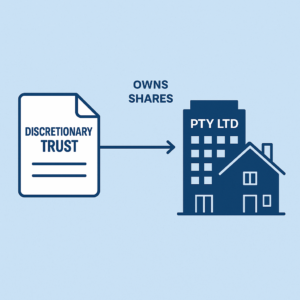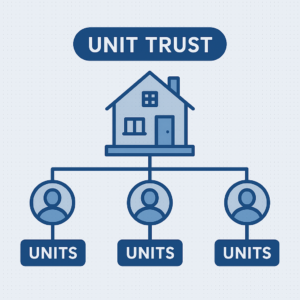Unit Trust Business Structure in Australia
A unit trust is a business structure where ownership of the trust is divided into fixed portions called units. Each unit holder owns a specific number of units, much like shareholders in a company.
This structure is commonly used for joint ventures, property investments, and business partnerships where multiple parties contribute capital and want profits distributed in proportion to their ownership.
Unlike a discretionary trust, where income distribution is flexible, a unit trust has fixed entitlements — meaning each unit holder’s share of income, losses, and capital gains is determined by the number of units they hold.
How a Unit Trust Works
A unit trust is established through a trust deed, which sets out:
-
The rules of the trust
-
The rights and responsibilities of the trustee
-
The rights of the unit holders
The trustee manages the trust’s assets and operations and must act in the best interests of all unit holders. The trustee can be an individual or, more commonly, a corporate trustee to provide limited liability and simplify management.
Each unit holder receives income and capital in proportion to the number of units they hold, as outlined in the trust deed.
Advantages
✅ Clear Ownership Structure
Each investor’s entitlement is fixed, making it transparent and suitable for joint ventures.
✅ Tax Flow-Through
Profits are generally distributed to unit holders and taxed at their individual or company tax rates, avoiding double taxation.
✅ Flexibility for Investment
Ideal for property developments, managed funds, and business investments where multiple parties contribute capital.
✅ Asset Protection
When managed correctly (especially with a corporate trustee), assets are protected from the personal liabilities of the unit holders.
✅ Attractive to Investors
Units can be transferred or sold, subject to the terms of the trust deed, providing flexibility for ownership changes.
Disadvantages
⚠️ Complex Setup
A professionally drafted trust deed is essential to ensure correct legal and tax treatment.
⚠️ Ongoing Compliance Costs
Annual accounting, record-keeping, and distribution resolutions are required.
⚠️ Limited Tax Flexibility
Unlike a discretionary trust, distributions must follow unit holdings — income cannot be varied to suit beneficiaries’ tax positions.
⚠️ Disputes Between Unit Holders
As each unit holder has fixed rights, disagreements may arise if not clearly addressed in the trust deed.
⚠️ Capital Gains Tax Implications
Selling or transferring units can trigger CGT events.
When a Unit Trust Is Suitable
A unit trust may be the right structure when:
-
Two or more parties jointly invest in a business or property
-
Partners want fixed entitlements and clear ownership shares
-
The business is investment-focused rather than trading-focused
-
Asset protection and profit-sharing clarity are key priorities
It’s commonly used in property development projects, investment syndicates, and professional service ventures.
Key Obligations
To operate a unit trust as a business, you must:
-
Have a trust deed prepared by a legal professional
-
Appoint a trustee (individual or company)
-
Apply for a Tax File Number (TFN) and Australian Business Number (ABN)
-
Register for GST if turnover exceeds $75,000
-
Maintain annual financial statements and lodge a trust tax return
-
Distribute income to unit holders according to the deed
Trustify Tip: A well-written trust deed is essential — it should clearly define unit rights, dispute procedures, and transfer conditions to avoid costly issues later.
Summary
A unit trust is a structured and transparent way to manage shared business or investment ownership. It provides clear profit entitlements, asset protection, and efficient tax flow-through.
While it offers less flexibility than a discretionary trust, it’s ideal for joint ventures, property investments, and businesses where multiple parties want defined ownership.
Information current as of October 2025. Reviewed by the Trustify Business Advisory Team. General information only — not financial or legal advice.
Others
-
October 20, 2025 Buying Property Under Your Personal Name in Australia: Pros and Cons
-
October 18, 2025 Service Trust Business Structure in Australia




